There are numerous reasons why your pigeon may bite you.
They include:
- Misunderstood biting
- To give a warning
- As a defense
- As protection
- Misbehavior
- Poor interaction
- Annoyance
- Illness
- Behavioral
Some creatures like rabbits may bite simply to check to see if you are okay and alive, a guinea pig may bite you to tell you to leave them alone, and a hamster may bite because it is scared.
Dogs may bite to play and cats may bite to show dominance.
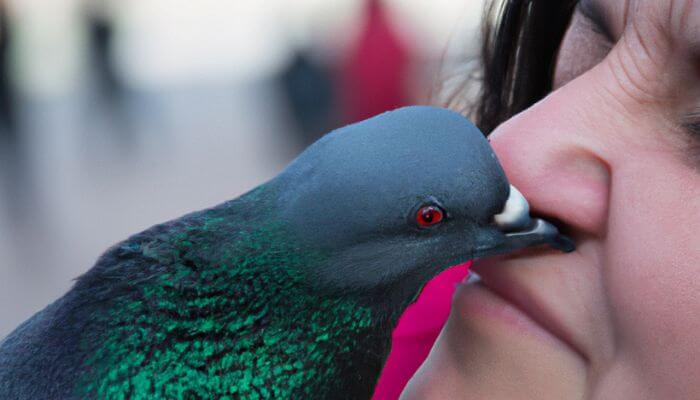
Some birds show dominance through biting, but that is not usually how pigeons decide who is boss.
If your pigeon starts biting you, there is probably a reason.
Here are a few potential reasons why your pigeon keeps biting you
1. Your Bird Isn’t Really Biting You
This is one of those things that isn’t obvious until you give it some thought, but have you ever seen a budgie or parakeet try to climb something?
It doesn’t have hands of any sort, so instead of reaching out and grabbing with its hands, it grabs things with its beak.
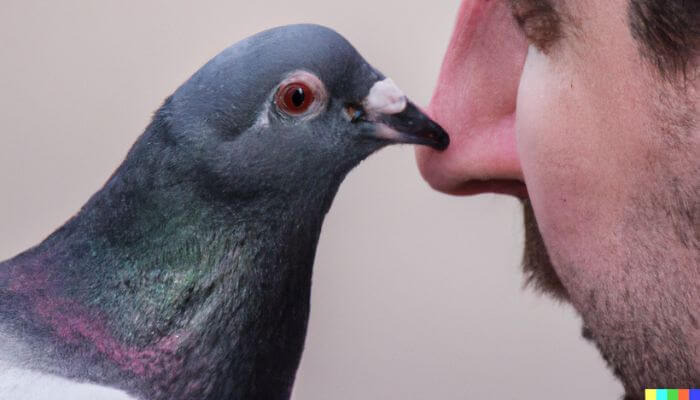
Though it isn’t as common, your pigeon may simply be using its mouth and its bite as its own pair of hands.
There is a good chance that your bird isn’t actually trying to bite you
2. A Warning Bite
If your bird isn’t giving you a beaking, if your bird is actually biting you, then it is often a warning bite. Just remember that your bird may not bite the thing that is scaring it.
Your pigeon isn’t a brain scientist.
If it sees something that it finds scary, it may try to bite whatever is closest.
If your friend is wearing a scary hat, but your hand is closest, then your hand may get bitten
3. A Defensive Manoeuvre
Moving on from the warning bite, your pigeon may be biting you because it is trying to defend itself.
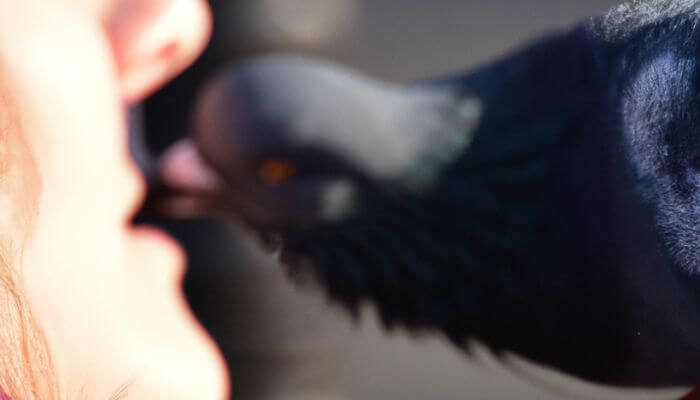
You can often tell if your pigeon is being defensive because it may puff itself up, it may make sounds, and it may ruffle its feathers.
Biting is sometimes a pigeon’s only defense if it feels unable to fly away or escape
4. A Protective Bite
Most pigeons would prefer to dive attack something that is threatening it or its young/eggs.
However, if backed into a corner, or if unable to act in a different manner, the bird may bite in order to protect something.
The weird thing is that the bird may be protecting something unexpected.
For example, if your kid put a few seashells into the bird’s cage or play area, then your pigeon may have taken a fancy to one of the shiny shells and may start protecting it.
There are also birds that will protect their nest when there is nothing in it, or who will protect their food or a treat because they fancy it as their own.
5. Your Pigeon is a Jerk
Animals are not people, they shouldn’t have the same rights, nor will they ever understand the world in the same way we do.
However, they do share a few traits with us humans, and one of the traits they can share is that they are just jerks.
Biting is a learned behavior, but some birds learn the behavior and then decide to roll with it.
Some pigeons are jerks, and that doesn’t mean you should mistreat them or dislike them, just appreciate them for the jerky sort of personality they have.
6. Incorrect Responses to Bird Behaviour
If your pigeon bites you and/or keeps biting you, then do not call out or correct the pigeon loudly.
Instead, give it no attention and perhaps even leave the general area.
However, it is very important that you return within ten minutes (or sooner) and start interacting with your pigeon in a positive way.
If you react loudly, then the pigeon will become scared and will probably bite more.
On the other hand, if the pigeon bites and then you go away for more than ten minutes, then it may misinterpret its bite as a way to make you leave.
React by being positive, staying calm, and interacting positively with the bird within ten minutes of the bite, otherwise, you may be encouraging future biting incidents in the future.
7. Keep Kids Away from Your Pigeons
There is a chance that something your children are doing is causing the biting behavior.
Typically, them being loud can cause a pigeon to bite.
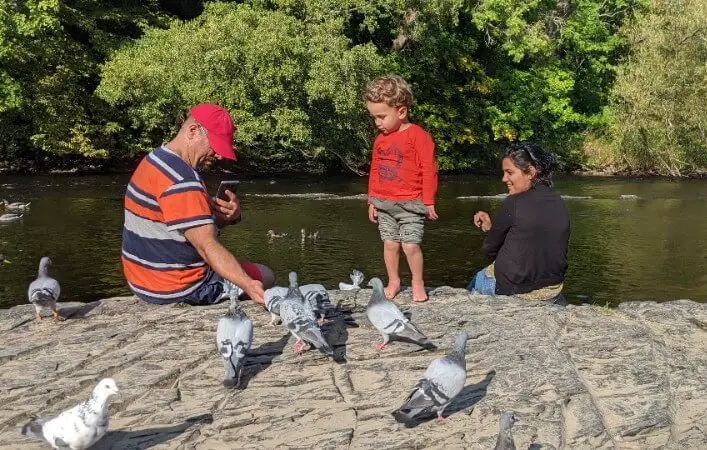
Or perhaps the child was bitten and reacted loudly and in a way that encourages more biting in the future.
Try keeping kids away from the birds for a while and see if the behavior improves. If the biting persists, then it probably isn’t the kid’s fault.
8. Your Pigeon is Not Very Well
We all get cranky when we are not well, and birds are no different.
Your pigeon may be biting for a number of related reasons that have been mentioned above, but the inciting reason may be some sort of illness.
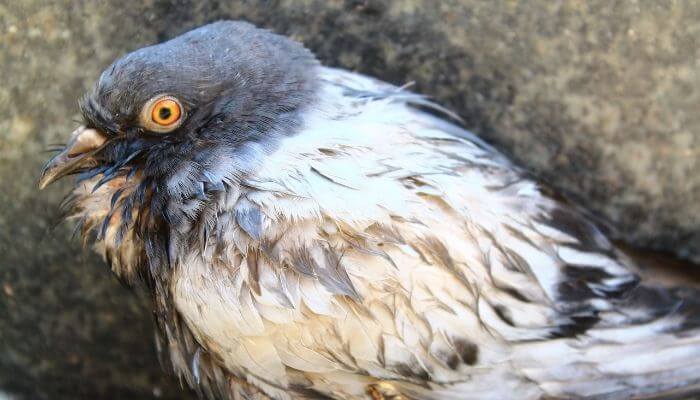
Remember that psychological illnesses may cause a bird to bite.
It isn’t always a medical issue relating to pigeon diseases that cause a bird to bite more.
9. Your Pigeon Learned it From Other Pigeons
Pigeons will sometimes learn behaviors from other birds they are around, and what some people forget is that they learn from other species too.
For example, if your budgie uses its beak to position itself on your fingers, then your pigeon may interpret that behavior as biting.
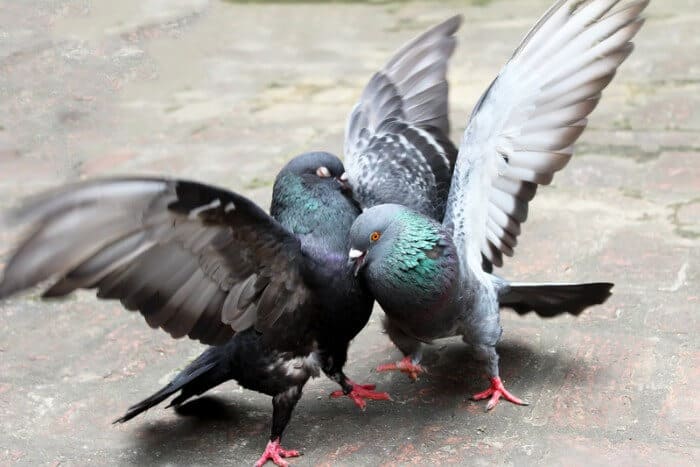
If you have a very domineering bird that bites other birds, then your pigeons may learn that behavior.
This is especially true if your pigeon lives with chickens, who are not above pecking each other in order to show who is in charge.
Addressing the Problem
If your pigeon is persistently biting you, you need to try to find the cause and remove it.
Illness is the easiest issue to identify because you can look for the symptoms of a sick pigeon.
If the issue is a psychological response, you’ll have to observe and understand your pigeon.
When it bites, look at the circumstances to see if you can establish a pattern.
If you can’t establish a reason, you’ll probably just have to accept that this particular bird is not happy with physical interaction and handle it as little as possible.
